Review of Rites Of Passage
Introduction
A film by Bobby Razak - who has produced other mixed martial arts (MMA) documentaries in his time - "Rites of Passage" is a documentary split into three parts: "The Inoue Brothers", "Vale Tudo", and "The Monster and The Wolf". It is a look behind the scenes of MMA (and in the case of Vale Tudo, no holds barred [NHB] fighting), and an insight into some of its participants.
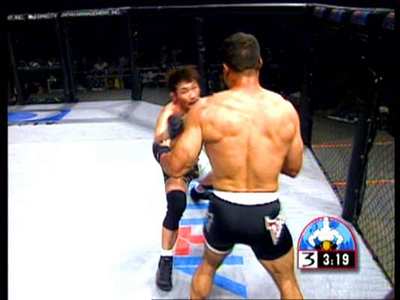
Video
Video is presented in 4:3 fullscreen PAL and is good for a DVD of this genre. The new interview footage with the likes of Mark Coleman and Kevin Randleman looks very good, although some of the competition footage is not of such a high standard. Still, those are source material issues rather than transfer issues, and aren`t detrimental to your enjoyment of the feature.
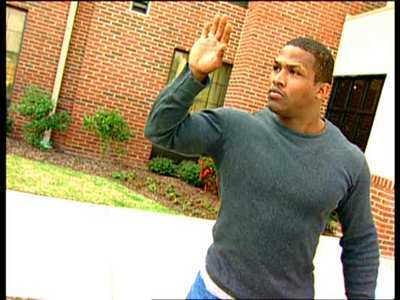
Audio
Audio is presented in Dolby Digital 2.0 and is good for a DVD of this genre. Dialogue is mostly clear, and on the rare moment that it is not, subtitles are provided. On some of the in-ring footage, the director has chosen to add hard rock music over the original commentary track, which is somewhat distracting, but nothing to really hurt the feature.
For German viewers, subtitles are available for the English track.
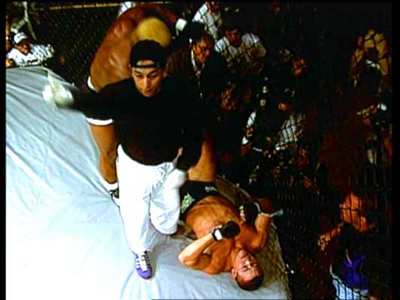
Features
The extras on this set accumulate to almost an DVD in themselves. Here, we have four segments, so to speak, entitled "MMA in Belfast", "Kevin Randleman: Journey of a Champion", as well as video profiles of noted wrestlers-turned-fighters Ron Waterman and Mark Coleman.
The "MMA in Belfast" feature is the longest segment of the four, and in its own way, is the most interesting. Speaking to Belfast-based fighters who work on local shows, this feature captures the bottom end of the MMA scale, a world away from the glamour of PRIDE or UFC. It is also very interesting to hear how Northern Ireland`s "Troubles" shaped the fighters` careers.
The three remaining extra features focus on fighters Ron Waterman, Kevin Randleman, and Mark Coleman.
The Waterman feature is interesting, as it probes his life away from fighting, where he is a schoolteacher. There is a lot of interview footage with Waterman, his wife, and his co-workers, as well as low-budget footage of him fighting on local shows. This is a very good profile of the former PRIDE and UFC fighter.
The next feature shows Kevin Randleman in the midst of preparing for two of the biggest fights of his career, against Pedro Rizzo at UFC 26 and Randy Couture at UFC 28. We see him training with close friend Mark Coleman, and explaining the circumstances behind his withdrawal from the originally-planned UFC 24 match with Rizzo. Again, there is a tremendous amount of interview footage used, which gives great insight into Randleman, who is known as a nice guy behind the scenes, but an extremely tough fighter inside the ring. There is some nice footage of the Rizzo fight, although much poorer footage of the Couture fight.
The aforementioned Coleman is the final fighter profiled, and he is shown preparing for his PRIDE FC 8 bout with Brazilian giant Ricardo Morais. The feature has plenty of interview material with Coleman and Randleman, and shows Coleman in training for the fight, as well as celebrating his win. Whilst not as thorough as the other extras here, this is an interesting look at Coleman, as well as PRIDE itself.
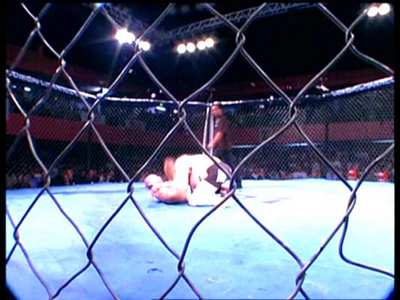
Conclusion
As mentioned in the introduction, "Rites of Passage" comprises three separate documentaries: "The Inoue Brothers", "Vale Tudo", and "The Monster and The Wolf".
The former is a look at Egan and Enson Inoue, two MMA fighters of moderate success, who despite being brothers, hold totally different attitudes towards the sport. Enson is the harder-edged of the two, keen to put himself across as a modern-day warrior, whilst Egan sees fighting as a financial means-to-an-end. There is some rare fight footage contained here, including Enson`s 1998 Vale Tudo win over Randy Couture.
The Vale Tudo (which is Portuguese for "anything goes") feature travels with Phil Ensminger as he goes to Brazil for the 2000 World Vale Tudo championships. This is fascinating, as Vale Tudo fight footage is very difficult to come across in the UK. Ensminger - who dropped off the fighting map in 2002 - somewhat plays up to the camera, as he recounts fighting in his youth, and shows little mercy when he is asked how he`d feel if he killed someone in the ring. It is most interesting to note his demeanour pre- and post-fight.
The final segment is named "The Monster and The Wolf", the respective nicknames of Kevin Randleman and Eugene Jackson, as they prepare for their respective fights at UFC 23, held in Japan. The power of the segment lies again in the differences between the fighters, as Jackson feels the need to be relaxed in the ring, whilst Randleman is the proverbial ball of energy.
Whilst all three features here are very good, I must admit some surprise at the direction of the documentary. I had fully expected this DVD to be quite positive in its attitude towards the sport, but instead - primarily in the former two segments - I found that there was an emphasis on showing how violent the sport can be. Enson Inoue speaks of how he can imagine dying in the ring, and Ensminger speaks nonchalantly of how he could potentially kill someone in the ring.
Furthermore, some viewers might be disturbed by the Vale Tudo footage, which at times can be rather barbaric. If anyone required ammunition against the sport, Vale Tudo would be a good place to start, as many of the practices banned in PRIDE and UFC (such as headbutts and groin strikes) are allowed in Vale Tudo. Unlike PRIDE and UFC, the fights are also bare-knuckle, and the referees are less sensitive to fighter safety. The director makes little effort to differentiate between Vale Tudo fighting (no holds barred fighting) and PRIDE and UFC (mixed martial arts). As such, the extended Vale Tudo scenes will be those that the viewer remembers, giving MMA organisations a bad name through association.
Overall, "Rites of Passage" is a good collection of MMA documentaries, backed up by similarly good extras. But some of the enjoyment of this 2-disc set is eroded by the fact that the director has in some instances gone out to shock, rather than promote the sport that has afforded him the opportunity to go behind the scenes.
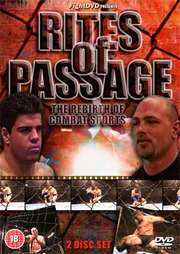
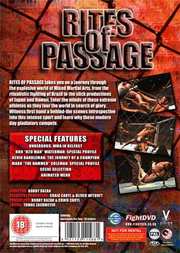




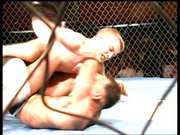
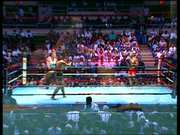
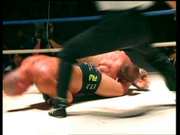

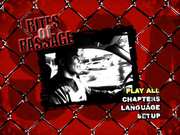
































Your Opinions and Comments
Be the first to post a comment!